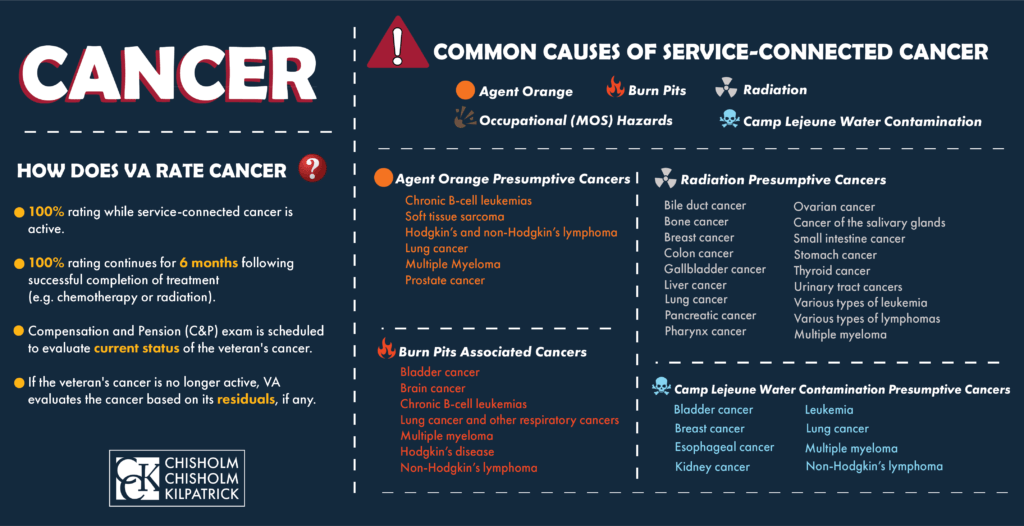VA Disability for Reproductive Cancers

CCK Law: Our Vital Role in Veterans Law
On August 10, 2022, the Honoring Our Promise to Address Comprehensive Toxics (PACT) Act of 2021 added 23 conditions to the Department of Veterans Affairs’ presumptive list for military toxic exposure. Among these conditions are reproductive cancers.
What Are Reproductive Cancers?
Reproductive cancers, or gynecologic cancers, are cancers that originate in women’s reproductive organs. There are five main types of reproductive cancers:
- Cervical cancer: Cervical cancer begins in the cervix (i.e., organ that connects the vagina to the upper part of the uterus). Early cervical cancer may have no symptoms; however, advanced cervical cancer can cause abnormal vaginal bleeding or discharge.
- Ovarian cancer: Ovarian cancer originates in the ovaries (i.e., the organs that make female hormones and produce eggs). Ovarian cancer may cause abnormal vaginal bleeding and discharge, pain or pressure in the pelvic area, abdominal pain, back pain, bloating, difficulty eating, and a change in bathroom habits.
- Uterine cancer: Uterine cancer starts in the uterus (i.e., the pear-shaped organ where a baby grows during pregnancy), also known as the womb. Symptoms may include abnormal vaginal discharge and bleeding, or pain or pressure in the pelvis. The most common type of uterine cancer is endometrial cancer.
- Vaginal cancer: Vaginal cancer begins in the vagina (i.e., the birth canal). While vaginal cancer may not cause symptoms early on, if it does, symptoms may include abnormal vaginal discharge or bleeding, a change in bathroom habits, and pain in the pelvis.
- Vulvar cancer: Vulvar cancer starts in the vulva (i.e., the outer part of female genital organs), most commonly on the inner edges of the labia. Symptoms of vulvar cancer may include persistent itching, burning, and bleeding in the vulva; changes in the skin color of the vulva; rash or warts; sores, lumps, or ulcers on the vulva; and pain in the pelvis.
Vaginal and vulvar cancer are very rare, only accounting for about seven percent of reproductive cancers in the United States. A sixth very rare type of reproductive cancer is fallopian tube cancer.
Out of these reproductive cancers, medical professionals can only screen for cervical cancer. Therefore, it is important to recognize the signs and symptoms of gynecologic cancers.
Treatments for reproductive cancer may include radiation therapy, chemotherapy, surgery, or a combination of these treatments. Women with a reproductive cancer often receive multiple treatments, although their treatment depends on the location and stage of the cancer.
Service Connection for Reproductive Cancers
Veterans with a reproductive cancer may be entitled to VA disability compensation if the cancer is related to their military service. First, they must establish service connection for their condition by showing evidence of the following:
- A current diagnosis of a reproductive cancer;
- An in-service event, injury, or illness; and
- A medical nexus linking the reproductive cancer to the in-service event.
Veterans can show evidence of this connection by securing a private nexus opinion from a medical professional and/or by submitting lay evidence. Lay evidence, or lay statements, can be written by the veteran or anyone who knows them and can speak to their condition.
VA may also schedule veterans for a Compensation and Pension (C&P) exam to determine if a connection exists.
Presumptive Service Connection for Reproductive Cancers
What Is Presumptive Service Connection?
The Department of Veterans Affairs (VA) presumes service connection for certain conditions based on the time and location of the veteran’s service. The intention is to make it easier for veterans to secure disability compensation.
Presumptions eliminate the need for veterans to provide a nexus opinion. They simply need to show they were in a certain place at a certain time and have a specific condition, and the link between the two is presumed.

PACT Act and Military Toxic Exposure Presumptions
As mentioned above, the PACT Act added 23 conditions to VA’s presumptive list for military toxic exposure, including reproductive cancers of any type. Essentially, veterans who are considered “covered veterans” can qualify for presumptive service connection for reproductive cancer. The bill defines covered veterans as the following:
- A veteran who, on or after August 2, 1990, performed active military, naval, air, or space service while assigned to a duty station in, including air space above:
- Bahrain
- Iraq
- Kuwait
- Oman
- Qatar
- Saudi Arabia
- Somalia
- United Arab Emirates
- A veteran who, on or after September 11, 2001, performed active military, naval, air, or space service, while assigned to a duty station, including the airspace above:
- Afghanistan
- Djibouti
- Egypt
- Jordan
- Lebanon
- Syria
If you were diagnosed with a reproductive cancer and served in one of these qualifying locations, VA will presume service connection and grant you disability benefits. This presumption also applies to surviving spouses of veterans seeking retroactive Dependency and Indemnity Compensation (DIC) benefits.
When President Biden officially signed the PACT Act into law, he and VA Secretary McDonough announced that the rollout period for certain presumptive conditions for covered veterans would be waived. Initially, these presumptions were effective upon the date of enactment of the PACT Act only for certain conditions, while presumptions for other conditions would become effective on a rolling basis over the next few years. Now, with this new rollout plan, the presumption for all conditions are effective from the date the PACT Act was signed (August 10, 2022) and VA will begin adjudicating these claims as soon as January 2023. Veterans should know, however, that newly eligibly claimants will not get retroactive benefits back to the date of their original claim unless they are filing a claim for DIC benefits.
View the full list of PACT Act presumptive conditions here.
VA Disability Ratings for Reproductive Cancer
VA automatically assigns a 100 percent disability rating to veterans with a service-connected active cancer, including reproductive cancers. This rating continues for as long as the cancer is active, and then for another six months following the successful completion of a treatment program, such as chemotherapy, radiation, or surgery.
VA will then schedule a C&P examination to reevaluate the status of the cancer. If the examination shows that the veteran’s cancer is no longer active and is in remission, VA will assign a disability rating based on the severity of its residuals.

Was Your VA Claim for Reproductive Cancer Denied?
If VA denied your claim for service-related reproductive cancer, Chisholm Chisholm & Kilpatrick LTD may be able to help. The accredited attorneys and claims agents at CCK have decades of experience assisting veterans in their pursuit of VA benefits. Call CCK today at 800-544-9144 to schedule a free consultation with a member of our team.
About the Author
Share this Post
